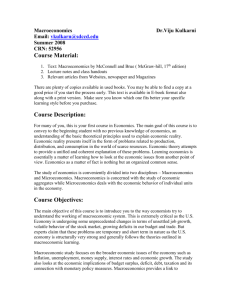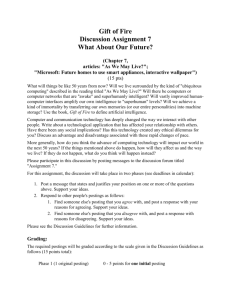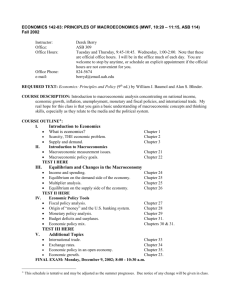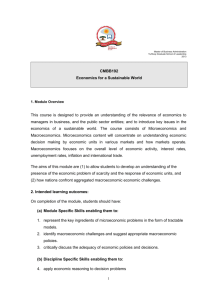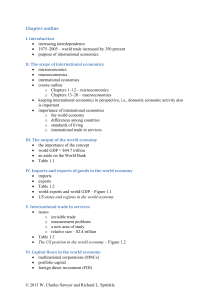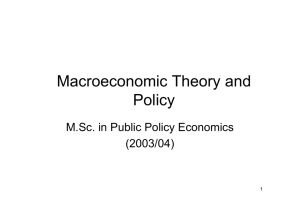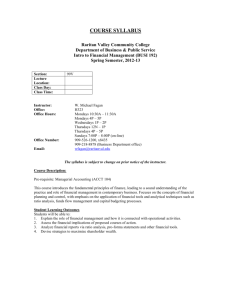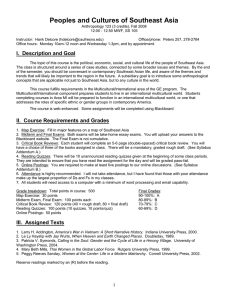Macroeconomics Dr.Viju Kulkarni
advertisement
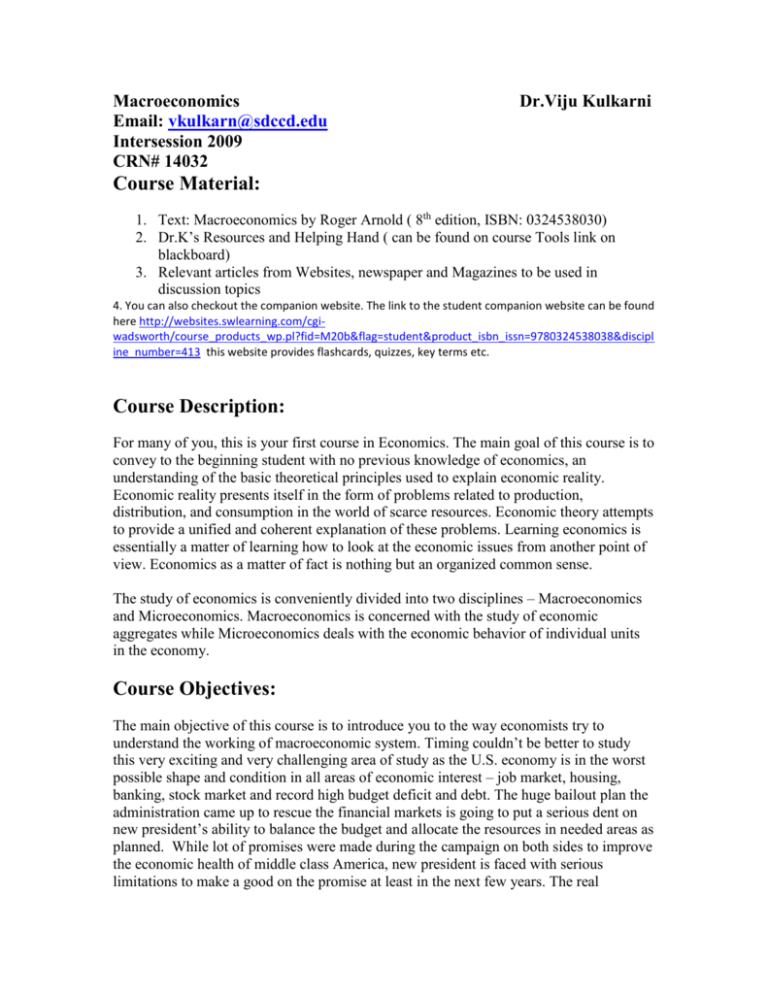
Macroeconomics Email: vkulkarn@sdccd.edu Intersession 2009 CRN# 14032 Dr.Viju Kulkarni Course Material: 1. Text: Macroeconomics by Roger Arnold ( 8th edition, ISBN: 0324538030) 2. Dr.K’s Resources and Helping Hand ( can be found on course Tools link on blackboard) 3. Relevant articles from Websites, newspaper and Magazines to be used in discussion topics 4. You can also checkout the companion website. The link to the student companion website can be found here http://websites.swlearning.com/cgiwadsworth/course_products_wp.pl?fid=M20b&flag=student&product_isbn_issn=9780324538038&discipl ine_number=413 this website provides flashcards, quizzes, key terms etc. Course Description: For many of you, this is your first course in Economics. The main goal of this course is to convey to the beginning student with no previous knowledge of economics, an understanding of the basic theoretical principles used to explain economic reality. Economic reality presents itself in the form of problems related to production, distribution, and consumption in the world of scarce resources. Economic theory attempts to provide a unified and coherent explanation of these problems. Learning economics is essentially a matter of learning how to look at the economic issues from another point of view. Economics as a matter of fact is nothing but an organized common sense. The study of economics is conveniently divided into two disciplines – Macroeconomics and Microeconomics. Macroeconomics is concerned with the study of economic aggregates while Microeconomics deals with the economic behavior of individual units in the economy. Course Objectives: The main objective of this course is to introduce you to the way economists try to understand the working of macroeconomic system. Timing couldn’t be better to study this very exciting and very challenging area of study as the U.S. economy is in the worst possible shape and condition in all areas of economic interest – job market, housing, banking, stock market and record high budget deficit and debt. The huge bailout plan the administration came up to rescue the financial markets is going to put a serious dent on new president’s ability to balance the budget and allocate the resources in needed areas as planned. While lot of promises were made during the campaign on both sides to improve the economic health of middle class America, new president is faced with serious limitations to make a good on the promise at least in the next few years. The real challenge for all the experts is to figure out what does it take to bring back the true resilience American economy always enjoyed. This is a great time to be studying and understanding how the macro economy works. Macroeconomic study focuses on the broader economic issues of the economy such as inflation, unemployment, money supply, interest rates and economic growth. The study also looks at the economic implications of budget surplus, deficit, debt, taxation and its connection with monetary policy measures. Macroeconomics provides a link to understand many global issues such as trade and payments, free trade issues and foreign exchange market. In addition to these conventional macroeconomic topics, we also focus on looking into the economic implications of current social issues such as global warming, recycling, outsourcing, health care and immigration in our discussion. By using basic macroeconomic concepts. This should make our learning more meaningful. Testing and Grading There will be 2 quizzes (Warm up and Final) 2 tests (Mid term and Final) and 4 discussion topic postings (read the specific instructions on this below) in this jet speed 4 weeks course. Each test will count 240 points towards the grade and each quiz will count 80 points and you are graded for the maximum of 700 (480 points from tests, 160 points from the quizzes and 60 points from discussion posting) points. Please read the specifics on discussion postings below. Each test will be 60 multiple choice questions from the selected list of chapters covered each week. Each quiz will contain 40 MC questions the selected chapters as listed below. I have provided you below with the chapters to read, questions to focus on for quiz and test. You can also check out my Resources guide ( Dr.K’s resource guide and Helping hand link on my home page) to help you understand the material better and prepare for test. To get most from the course in this short period of learning, first read the sections from my resources and then read the text. The schedule we have set up for tests stays valid unless I inform you otherwise. I will announce the changes, if any in the class lounge and by email but you need to pay attention to what goes on and check the class lounge and email frequently. Talk to me freely if you have any questions, concerns and problems. Grade Distribution: 89% – above 79- 88% 69 – 78% 59- 68% Below 59% A B C D F Final grade is based on a straight scale in accordance with district’s policy. But the borderline cases are decided to your advantage based on your interest, commitment and quality of your writing in the discussion board postings. If you do not participate in the weekly discussions actively, I will either drop you from the class or lower your grade by one level. Good luck. This is a fun and rewarding class with lot of information that are used in your future decision making. Posting on discussion – Participation in threaded discussions Students must participate in all threaded discussions. I will post the question in the discussion Board on the first Monday of each week and you must post your thoughts on the topic by Sunday night ( 10 pm) of each concluding week. You are expected to do one original posting with your thoughts and comments (10 points) on the posted topic and one reaction to others’ posting ( 5 points). You cannot do both postings on the same day. They must be done on different days during the week. I also discourage you from doing the posting at the last minute on the last day as I believe that last minute posting is an indication of poor planning and poor performance. Ignoring this will result in lower grade. Anything posted after the due date and time will not get any credit . You will be graded on your participation and the quality (or thoughtfulness) of your contribution to the postings. Quality can come in the form of making insightful comments, asking probing questions, using your critical thinking skills, listing references you used among other things. Your posting must be at least half a page length. Do not wait until the last minute post your comments. Please Note: To make it convenient and easy for you, I have set 10 pm on Sunday of each week as the deadline for all submissions. Please remember, this is a 4 week course moving at a jet speed covering the entire semester material. This class is fun and very rewarding but you must keep up with the reading, postings and preparing for the test each week to reap the maximum benefit. Quiz/test dates, material and study questions to focus on, along with the specific dates to complete the other activities are listed in the “ Class Schedule” link on the home page.
